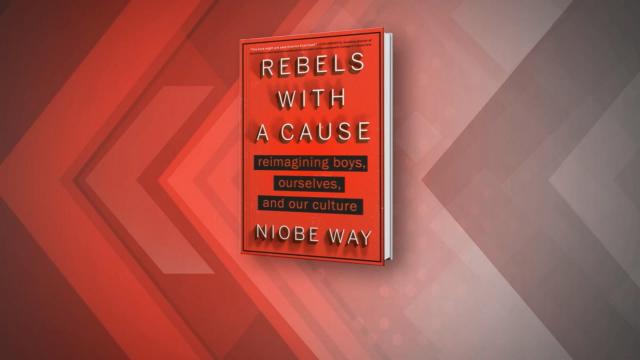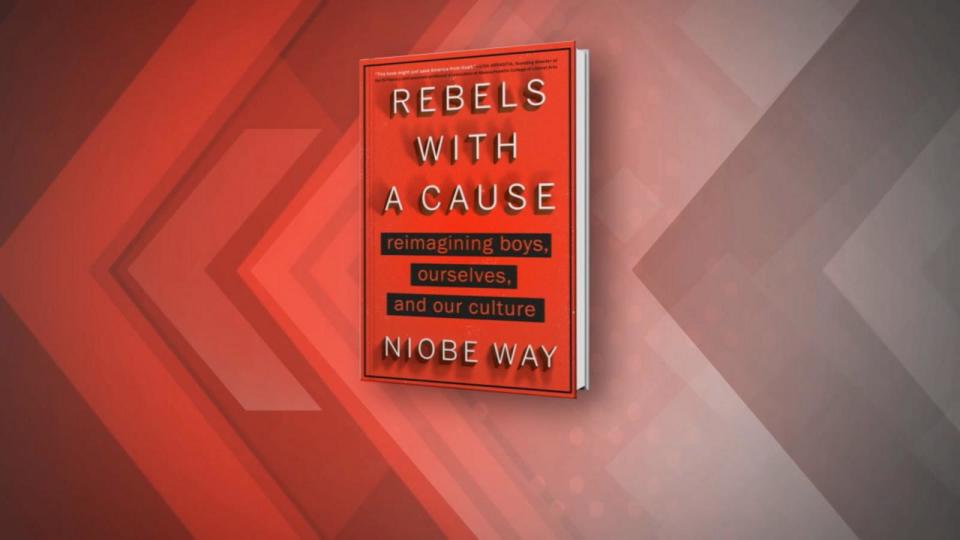There's a way society can better raise boys, psychologist says

NYU professor of developmental psychology Niobe Way sat down with ABC News to discuss her book, "Rebels with a Cause: Reimagining Boys, Ourselves, and Our Culture," which explores how society can better raise boys.
Over the years, Way has studied what she refers to as" boy culture" Her book includes case histories and studies that outline the negative impacts on boys when cultures and societies prioritize independence and assertiveness over our inherent abilities to care, listen and rely on one another.
In her book, she says that society often blames violence, suicide and mass shootings on lack of gun control or mental illness. However, she argues that the root cause of many societal issues is the loneliness experienced by boys.

Way talked about her book in more detail.
ABC NEWS: New York University professor of developmental psychology Dr. Niobe Way has, for decades, studied what she calls boy culture. And in her new book, "Rebels with a Cause: Reimagining Boys, Ourselves, and Our Culture," she cites case histories and studies which detail the harmful effects on boys when cultures and societies stress independence and assertiveness over our natural capacities to care, listen, and depend on one another.
Dr. Niobe Way, thank you so much for joining us. So one thing that I thought was really interesting in your book, you talk about how we often blame violence, suicide, mass shootings on lack of gun control or mental illness. But you say that the, the root cause of many of our societal issues is based on loneliness of boys. Explain that.
NIOBE WAY: Absolutely. So what I learned from listening to lots of, so I've been doing this for about four decades, doing research on boys and young men. And what we learned from them is that the roots of their struggles, not only, but their struggles, but also our struggles. So the roots of our depression, anxiety, loneliness, suicide, mass violence really comes from being raised in a culture that I call boy culture that clashes with our human nature and our human nature is to want to be in relationship or starving to be in relationship.
We're social animals. We have natural relational skills. Boys show us that they're incredibly relationally intelligent. We hear that when you interview them in early adolescence, and then as they grow up and the pressures to man up, and the pressures to man up for all sorts of people at this point, regardless of identity, to be hard over soft, that's boy culture, leads us to actually disconnect from ourselves because we're naturally hard and soft.
It's not masculine/feminine. We're naturally, we think and feel that's not gendered. That's actually just human. And so we grew up in a culture that makes it masculine or feminine to think or feel, and then that gets us into trouble, boys, definitely, but also everybody else.
ABC NEWS: And you talk also about how this concept that we put on boys like boys will be boys or, or they have that testosterone and that aggression. And but you say it's wrong.
WAY: Yeah. Fundamentally we have all sorts of ways of being as humans, and aggression is one of them. I'm not saying we're not aggressive. I'm not saying men are not aggressive. That would be silly to say that. But we also have this softer side, all of us. And my main message of my work is it's not just girls and women that have this softer side. It's not just them being feminine, it's everybody.
So when you listen to boys talk about their friendships, their lives, what they want in their lives, they talk about wanting emotional intimacy in their friendships, wanting other guys to talk to without being laughed at. They talk about that extensively, but we somehow stereotype them. We, I call it a thin story. We tell thin stories about each other that makes it seem as if that's unusual or odd, that they have this soft side. And biologically they're just wired to be different than women and girls.
And that's just simply not true. And how I know it's not true from listening to young people for almost four decades, and they just very explicitly say they want relationships. All of everybody says this, boys and young men included. Boys and young men of color from working-class communities, from all sorts of communities, say the exact same thing: I want to be in a relationship, in a friendship where I can really share my deep secrets. I want to be cared for. I want to love. I want to have love, and I and they show that they have the natural relational skills to do that.
So to me, what's incredible to me, as we continue to perpetuate these stereotypes, that there's biological differences between men and women and their emotional needs and capacities, and it's just not true.
ABC NEWS: You say that you often study in particular boys and young men of color. Why is that?
WAY: Because what you hear from people who are oftentimes on the fringes of power, they're not in the center of power. They're from working-class communities. They're not sort of in the wealthy communities. They often have at times, have more insight into what's going on, what's going on in our culture, not just for them, but actually for the whole culture. And that's been written about a lot, is that people on the outside of the power structure have more insight into what's actually going on in the inside.
So the beautiful thing to me about my work is that these are mostly boys of, young boys and young men, of color, from working-class communities that teach us not only about them, but about us, and what's getting in the way of our own capacity to connect to ourselves and each other, and also how we solve the problem. So they teach us what it means to be human. What's getting in a way, the way our boy culture is getting in the way of us acting like humans with each other. And then they teach us the solutions, which is an important part of the story as well.
ABC NEWS: There has been, as you're well aware, this term that really kind of came up in the last few years, this anti-woke culture. And you've described how that can be particularly harmful or dangerous for boys and young men.
WAY: Yeah. I mean, basically what's happening and you see this in a political culture now, we see it with [President Joe] Biden and [former President Donald] Trump as well, is implicit in boy culture, is a hierarchy. It's a hierarchy of the hard over the soft, thinking over feeling, the me over we. But it's also a hierarchy of humanness where we think certain humans are more human than others, and so we're all trying to get on top.
And so what you do with this anti-woke culture as well as right, both you see it in the left and the right, is that we're all trying to get on top and put the other group on the bottom. And the message I have coming from boys and young men, including mass shooters, by the way, nobody wants to be on the bottom. Nobody wants to be on the bottom. So every time in our politics and our lives, in our homes, that we just flip the hierarchy, you know what I mean by flip the hierarchy? We just put who we don't like on the bottom and who we like ourselves on the top.
Nobody wants to be on the bottom and no one should be on the bottom. So the idea is, what we learn from boys and young men is to stop doing that. Disrupt the whole hierarchy of humanness. I know it sounds like a mouthful, but that actually is coming from mass shooters saying, 'I don't want to be seen as less human than other people.' And that's, that's oftentimes where their anger comes from, is feeling like they are being put on the bottom.
ABC NEWS: Really fascinating stuff there. Dr. Way, we really appreciate your time and insight. I want to let our viewers know her new book, "Rebels with a Cause: Reimagining Boys, Ourselves, and Our Culture," is available now wherever books are sold.
There's a way society can better raise boys, psychologist says originally appeared on abcnews.go.com